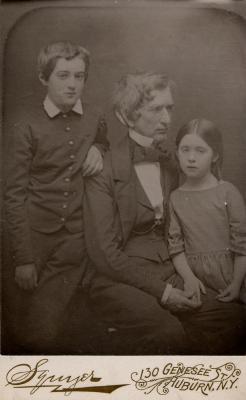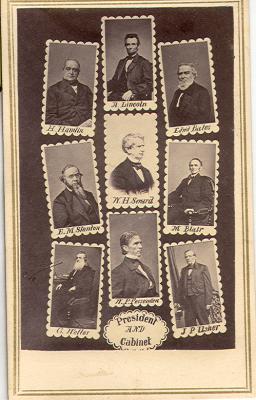William Henry Seward
William Henry Seward was one of the foremost politicians of nineteenth century America. Seward was a New York State Senator, Governor of New York, a United States Senator, and served as Secretary of State in the Lincoln and Johnson administrations. He is credited with spearheading the purchase of the Alaskan Territory from Russia in 1867. Between his terms of service as Governor and US Senator he was a high profile attorney who pioneered the insanity defense. Seward spent his entire career guided by a few constant core beliefs; that all Americans were born equal and entitled to the same individual liberties, and that new technology and infrastructure were the key to ensuring America’s place as a world power. As a politician he tried to operate with the perfect synthesis of pragmatism and idealism. His task during the civil war was perhaps the most difficult ever faced by any Secretary of State; to maintain the neutrality of foreign countries during our darkest hour, and during a period in history before international law and modern diplomacy.
 William Henry Seward started his life in Florida, New York, a small town in Orange County. He was born in 1801, eight years before Abraham Lincoln. His father, Samuel Seward, was the town postmaster. The elder Seward did in fact own slaves. Slavery was not abolished in New York State until 1827. However, Samuel Seward sent his slave children to school along with his own biological children. Therefore young Seward spent plenty of time in contact with the family servants, and later claimed to prefer the “conviviality of the slave kitchen to the severe decorum” of his father’s front parlor. In his autobiography Seward wrote “I early came to the conclusion that something was wrong with slavery and that determined me to be an abolitionist.”
William Henry Seward started his life in Florida, New York, a small town in Orange County. He was born in 1801, eight years before Abraham Lincoln. His father, Samuel Seward, was the town postmaster. The elder Seward did in fact own slaves. Slavery was not abolished in New York State until 1827. However, Samuel Seward sent his slave children to school along with his own biological children. Therefore young Seward spent plenty of time in contact with the family servants, and later claimed to prefer the “conviviality of the slave kitchen to the severe decorum” of his father’s front parlor. In his autobiography Seward wrote “I early came to the conclusion that something was wrong with slavery and that determined me to be an abolitionist.”
He was a bright young man who entered Union College at the age of 15 and graduated at the top of his class. He began the study of law and passed the Bar exam in 1823. In January of the next year he was made junior partner in an influential law firm in the bustling town of Auburn, NY. His senior partner, Elijah Miller, was the father of Frances Adeline, a friend of Seward’s sister whom she had met while they both attended the Emma Willard School in Troy, NY. Shortly after the Miller-Seward firm was established, William asked Elijah Miller for permission to propose to Frances. Miller agreed with the understanding that Seward and his bride would live in Judge Miller’s home on South St. in Auburn. Being a widower, Miller also shared the then 10 room home with his mother, sister, and another daughter.
Despite his own claim later in life, Seward was not an abolitionist. He did support the rights of African Americans and remained morally opposed to slavery throughout his legal and political career. Seward was one of many anti slavery moderates that supported the gradual ending of slavery throughout the United States. His wife Frances, however, constantly pressed Seward to support the immediate emancipation of all slaves, even going so far as to instruct him to quit Lincoln’s cabinet if anything less was settled on. As a moderate, Seward often found himself being accused of radicalism by his Southern colleagues while at the same time being accused of being too compromising by the true radicals of the day.”
Seward, now married into a wealthy and influential family, began his career. He was elected to the New York State Senate in 1831, serving until 1834. He failed at his first attempt to get elected governor, but eventually attained the office at the age of 37. After two two-year terms as governor Seward concentrated on his legal practice, increasing his notoriety even more. He negotiated a massive arbitration program on behalf of the Holland Land Company that settled a mortgage crisis affecting the western half of New York State. Seward also became known for his pro bono work on behalf of those no other attorney would defend. After his use of the insanity defense in the trial of William Freeman, Seward was known as a great advocate for the defenseless with a sharp legal mind.
 He became U.S. Senator from NY in 1849, one of only a few strictly anti-slavery politicians. After a colorful tenure in Congress Seward had his eye on the highest office in the land, but was defeated in the Republican primary by a single term legislator from Illinois, Abraham Lincoln. Despite their initial rivalry and Lincoln’s victory, Seward campaigned in earnest for the new candidate. Lincoln soon asked Seward to serve as Secretary of State if he won the election.
He became U.S. Senator from NY in 1849, one of only a few strictly anti-slavery politicians. After a colorful tenure in Congress Seward had his eye on the highest office in the land, but was defeated in the Republican primary by a single term legislator from Illinois, Abraham Lincoln. Despite their initial rivalry and Lincoln’s victory, Seward campaigned in earnest for the new candidate. Lincoln soon asked Seward to serve as Secretary of State if he won the election.
Seward served with distinction and great political aptitude under Lincoln, and in the end the rivals became close colleagues. Seward was violently attacked on the night that Lincoln was shot as part of a larger conspiracy by a rogue group of Confederate sympathizers. He survived and ultimately recovered. He continued at his post under President Andrew Johnson, under whose administration Seward negotiated the purchase of Alaska, soon given the moniker “Seward’s Folly,” which is perhaps the achievement most remembered by posterity.
Upon his retirement, Seward traveled the world on a grand tour which spanned 15 months and several continents. He returned home an old but satisfied elder statesman. Surrounded by his family he passed away in October of 1872 in his office.

